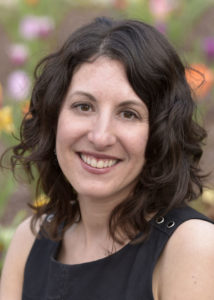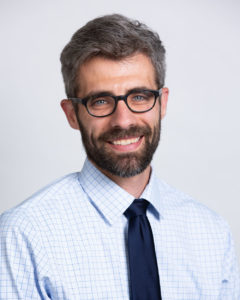DANBURY, CONN. — Western Connecticut State University faculty members Dr. Maya Aloni and Dr. Joshua Cordeira have received recognition from the Connecticut State Colleges and Universities Board of Regents as the WCSU recipients of the board’s 2021 teaching and research awards.

Aloni, an associate professor of Psychology and director of the Relationship Research Lab, has earned the top BOR Teaching Award honoring the faculty member at the CSCU system’s four state universities who best exemplifies excellence in teaching. Cordeira, an associate professor of Biological and Environmental Sciences and director of the Neuroscience Research Lab, has been selected to receive the campus-based BOR Research Award given annually to the WCSU faculty member who demonstrates superior quality in research.
Aloni joined the WCSU Psychology Department faculty in 2013 after serving as an instructor at Middlesex County College in New Jersey. She earned bachelor’s degrees in Psychology and Philosophy from the University of Toledo and a Ph.D. in Social-Personality Psychology from the University at Buffalo, SUNY.
Aloni observed that teaching during a year of pandemic offered surprising and welcome opportunities to work with students and faculty colleagues in pursuing fresh innovations useful in both online and in-person instruction, supported by WCSU’s longstanding emphasis on quality teaching.
“I am so grateful to have been able to teach during the pandemic,” she said. “Three goals guide my approach to teaching — fostering a sense of community, fostering an appreciation for psychological science, and preparing students for citizenship and the workforce. My class structure and activities are all designed to meet these goals.”
Building community was an especially important goal during the pandemic, she noted. This focus provided the inspiration for a “flipped classroom” approach allowing students to watch lecture videos and complete assigned tasks prior to each scheduled class where they came together in online breakout rooms for small group discussions. “Interacting consistently with the same group of peers throughout the semester helped students to connect with one another and to me during this time of social isolation,” she said.
As part of her classroom instruction, Aloni replicates psychological experiments and incorporates hands-on activities to help students better understand the concepts taught in her courses. “I am lucky because social psychology is simply fascinating and students can easily gain enthusiasm for the subject,” she remarked. Emphasis on organizational, critical thinking and public speaking skills prepares her students as citizens and workforce participants, she added. “I believe that if I create a sense of community and a safe environment in the classroom, students gain more confidence to take risks and challenge themselves,” she said.
Aloni has been the coauthor of eight published articles and participated in 35 research presentations, workshops and public talks focusing on her research specializations in adult romantic relationships and the scholarship of teaching and learning. Her Relationships Research Lab at WCSU currently is investigating how gluten-free and vegan dietary restrictions may influence the dating practices and romantic interests of those who follow such diets as well as of their prospective partners. Another current focus of research is how relationships in the classroom may be developed in a way that fosters students’ critical thinking skills through meaningful in-person and online discussions.
Students who work in her research lab gain extensive opportunities for experiential learning by conducting literature reviews, collecting data, programming studies on the computer, and presenting findings at professional regional and national conferences. With support from the WCSU Foundation, students majoring in theatre arts and graphic design have assisted Aloni in creating videos for research and in developing the lab’s website.
“I am highly invested in my students’ success and maintain contact with them even after they graduate,” she said. “It is a very rewarding experience to see them develop research skills, and it is especially exciting when they teach me something new.”

Cordeira joined the WCSU biology faculty in 2014 after pursuing post-doctoral studies as a fellow at Harvard Medical School in the Research Training Program in Sleep, Circadian and Respiratory Neurobiology. He earned his B.S. in Biology with minor in Psychology at Stonehill College and a Ph.D. in Neuroscience at Tufts University. His doctoral research examined hypothalamic control of the physiological need to eat and the reward system in the brain that promotes consumption of fattening food in excess of dietary need, yielding findings that have helped to identify new therapeutic targets for prevention of metabolic disease. He has coauthored 14 articles in Current Biology, Physiology and Behavior, The Journal of Neuroscience and other professional publications.
Studies in Cordeira’s Neuroscience Research Lab at WCSU have explored various aspects of the biological mechanisms in the brain that regulate behavior. “I love to sleep, eat and exercise, so I channel my enthusiasm for these activities into my research,” he observed.
In collaboration with professional colleagues at Harvard, Cordeira has used sleep deprivation to model cognitive and behavioral impairments observed in mental health disorders. Another line of research exploring the effects of exercise in reducing high-fat food intake has opened new avenues of neurobiology investigation that hold the promise of more effective intervention strategies to address obesity. He noted this research is important because nearly one-third of adults in the United States face increased risk of mortality from diabetes and cardiovascular disease due to excessive weight and obesity.
“In my lab, we use mice fed high-fat food as a model for diet-induced obesity,” he said. “By giving the mice running wheels for exercise, we study the biological basis for the benefits of exercise in feeding behavior and body weight regulation. We’ve recently shown that low-intensity exercise, for as little as 30 minutes daily, can reduce the temptation to overeat.”
As the mentor for 12 WCSU students who have conducted, presented and published their own research projects in his lab over the past five years, Cordeira has discovered a passion for scientific discovery much like his own when he first engaged in biological research as an undergraduate.
“Now I enjoy offering similar opportunities to inspire the next generation of scientists,” he said. “I’m proud to say these young scientists have gone on since graduation to pursue careers as nurses, doctors, physician assistants, veterinarians, teachers, researchers and even a lawyer. Watch out world!”
Cordeira expressed gratitude to his mentors, faculty colleagues and students “who each have inspired and worked with me in the pursuit of research. Research is fun! What could be more exciting than using science to experiment, to learn and to make sense of the world within and around us?”
Western Connecticut State University changes lives by providing all students with a high-quality education that fosters their growth as individuals, scholars, professionals and leaders in a global society. Our vision: To be widely recognized as a premier public university with outstanding teachers and scholars who prepare students to contribute to the world in a meaningful way.
